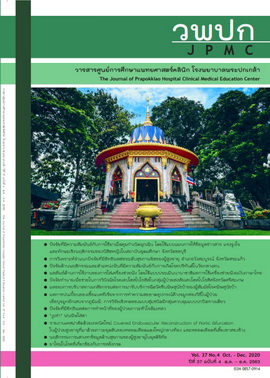A Discriminant Analysis of Factors Influencing Mental Health levels among Elderly in Wangsomboon District, Sakaeo Province
Main Article Content
Abstract
Background: Thailand is an aging society, resulting is increased dependency. A decrease in self-esteem and changes in values for the elderly have been observed in Thai society which affect lifestyle and good mental health.
Objectives: To study the mental health level, analyze, classify factors influencing mental health levels, and to create equations to classify factors that influence mental health levels for the elderly.
Materials and methods: This research was study of predictive research. The sample consisted of 701 elderly people in Wangsomboon district by stratified random sampling. The instrument was an interview form for the factors influencing the mental health level of the elderly in Wangsombun district Sakaeo province. The statistical analysis was frequency, percentage, mean, standard deviation and discriminant analysis.
Results: 38.7% of the elderly had a level of mental health equal to that of the general public. 37.7% of the elderly had a level of mental health greater than that of the general public and 23.6% of the elderly had a level of mental health lower than that of the general public. Furthermore, the participation of the elderly club members and the activities of daily living (ADL) scores were factors that could classify the levels of mental health in the elderly. Three median values could predict a group of elderly with mental health level higher than general public by 47.8%. These values could create an equation of standard score showed as follow: Zy = - 0.444 (participation of the elderly club members) + 0.754 (ADL scores)
Conclusion: The participation of the elderly club members and the activities of daily living (ADL) scores were factors that could classify the levels of mental health in the elderly. These two variables could predict the levels of mental health in the elderly at highest level.
Article Details
References
Institute for Population and Social Research, Mahidol University. Situation of Thai elderly 2016. Bangkok: Amarin Printing; 2017.
Ministry of Social Development and Human Security. National plan for older persons No. 2 (2002-2021). Bangkok: Theppenwanit printing house; 2010.
Guo YQ, Zhang CC, Huang H, Zheng X, Pan XJ, Zheng JZ. Mental health and related influencing factors among the empty-nest elderly and the non-empty-nest elderly in Taiyuan, China: a cross-sectional study. Public Health 2016;141:210-7.
Sukanun T, Subprasert J, Jariyasilp S, Vongsala A. Factors affecting exercise behaviors of the elderly people in Bansuan Municipality, ChonBuri. The Public Health Journal of Burapha University.2014; 9(2) : 66-75.
Mongkol A, Wongpiromsat Y, Tangsirat T, Phanphanom W, Romsai P, Jutta W. Acknowledgment of the results of the research on the developement of the Thai mental health indicators (Version 2007). Bangkok: The Agricultural Cooperative Federation of Thailand; 2009.
Gray R, Thongcharoenchupong N. Factors affecting mental health of the elderly. Thai Population Journal 2012; 3(2): 45-63.
Hair JF, Black WC, Babin, BJ, Anderson RE. Multivariate data analysis : a global perspective. 7thed. New Jersey: Upper Saddle River ; 2010.
Kumdee P. Factors Influencing behavior of health promotion of the elderly in Amnat Charoen Province [dissertation] .Ubon Ratchathani: Ubon Ratchathani Rajabhat University; 2012.
Thongvisase T, Kingminghae P, Suparatanagool S, Isarapreeda P. Developing activity model embedded in mental health process prototype for elderly promotion. Journal of Education Mahasarakham University.2015:9(special ed): 219-34.

